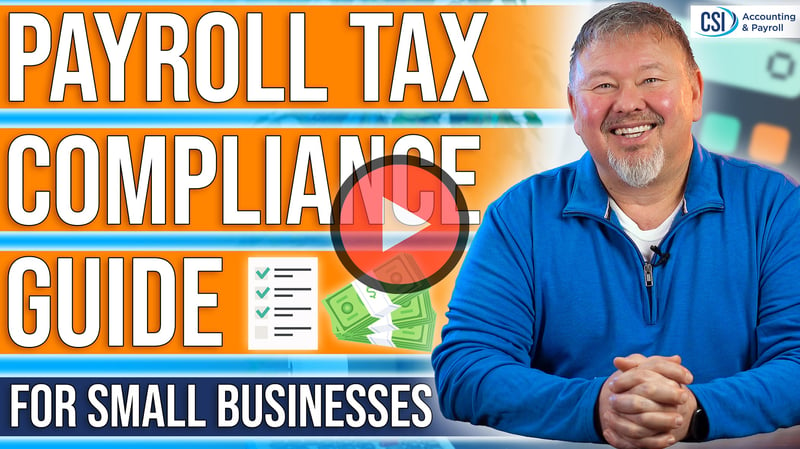Small Business Laws and Rules: The Basics of Payroll Compliance
December 5th, 2023 | 6 min. read

When you own a small business, you’re only sure of two things: Your business is your passion, and you want to keep its doors open. To keep your company running, you have to follow the rules.
At CSI Accounting & Payroll, we’ve helped keep thousands of businesses in compliance for over 50 years. However, we can only offer guidance and suggestions. Ultimately, staying in compliance is your responsibility. How do you do that?
This article will guide you through the essential steps to meet all of the requirements at these levels:
- Federal
- State
- Local
Federal Compliance
On a federal level, there are quite a few things you need to do to keep your business in compliance.
When you start a business, you’re auto-enrolled with the Electronic Federal Tax Payment System (EFTPS) and receive your PIN in a letter. Follow the instructions in the letter to add a password, then you can log in to view your business tax payment history. You can also link your EFTPS login to your bank account and use this site to make your tax payments.
FICA and Withholding Tax
You need to determine your payroll deposit schedule. You are a monthly depositor unless you get a letter from the IRS that says you’re a semi-weekly depositor. There are some exceptions, so make sure you ask your payroll specialist if the rules apply to you.
Make sure you submit your quarterly 941 IRS tax filings on time. They’re due at the end of the month that follows each period. You can do this via a paper return or upload to the IRS website, or you can work with a payroll specialist.
Unemployment Tax
You need to pay your unemployment taxes on time. There are thresholds that allow you to pay it later, but as long as you pay at the end of each quarter, it won’t be late. Make sure you also submit your annual 940 IRS tax filings by January 31 each year. You can do this via a paper return or upload to the IRS website, or you can work with a payroll specialist.
Wage and Tax Statement
You are also required to file W-2s annually with the Social Security Administration. This form is specific to each of the employees you compensated throughout the year, so they will all have their own separate form.
This provides information concerning how much each employee earned in taxable wages and how much federal and state taxes were withheld. The form is due to the SSA and to your employees by January 31 each year.
Responding to Letters From the IRS or the SSA
Every business is subject to getting letters from the federal government. If you receive a letter from the IRS or SSA, open it immediately and follow the directions inside. There may be a deadline written in the letter. If you have questions about what to do, a payroll specialist can help you.
State Compliance
On a state level, there are also many things you need to do to keep your business in compliance.
Withholding Tax
If you have employees in a state that has withholding, you are required to withhold state income tax withholdings from employees’ pay based on how they complete their W-4. (Which W-4 you use – state or federal – will depend on which state the employee works in. Some states follow the federal form while others have a separate form.)
The withholdings will need to be remitted to the state depending on your deposit schedule, and reconciliation reports will need to be submitted to the state website based on your filing schedule in that state.
Unemployment Tax
For most businesses, state unemployment tax is mandatory. You have to support unemployment benefits for your eligible workers in the case that they may become unemployed. Make sure you’re registered with the state's workforce agency, then report wages and pay unemployment taxes. This is done quarterly, and you can face penalties if you fail to file and pay this tax.
Workers’ Compensation Insurance
Nearly every state requires you to provide workers’ compensation insurance, and some require you to get it through the state’s program.
Generally, if you’re the owner and the only worker, you don’t need it for yourself - but you need this insurance as soon as you hire your first employee! Your insurance provider may also want to cover any independent contractors unless you show them proof that they have insurance.
To determine your obligations and required coverage, you can check with the state’s workers’ compensation authority, your company’s liability insurance agent, or your payroll professional.
Responding to Letters From the State
Every business is subject to getting letters from their state government. If you receive a letter from your state, open it immediately and follow the directions inside. There may be a deadline written in the letter. If you have questions about what to do, a payroll specialist can help you.
Local Compliance
Don’t forget that some local areas have payroll taxes as well.
Local Taxes
There may be some local taxes based on the municipality or school district. Make sure you are aware of the taxes that apply to employees based on where they reside and where the work is performed. A payroll specialist can help you figure out if any local taxes apply to your business, as well as what you need to do about them to stay in compliance.
Get Compliance Advice From an Expert
Ultimately, staying in compliance is up to you. However, now that you know about how a payroll specialist can help you navigate various federal, state, and local business requirements, are you ready to check out payroll services?
If so, please consider CSI Accounting & Payroll! Find peace of mind in being able to focus on running and growing your business - and leave the compliance up to us. To see if we can be a good fit for your business, click the button below for a free consultation:
Not ready to talk? That’s okay! First, learn more about what a payroll service costs by clicking the image below:
Bret is the Chief Operating Officer at CSI Accounting & Payroll, a role he stepped into in 2024. He began his journey with CSI in 2007, starting in a marketing position and eventually becoming the Payroll Department Manager, where he played a key role in helping CSI's expansion and long-term success. His background in sales and management – along with a degree in Computer Networking and Certified Payroll Professional (CPP) title – continues to serve him well in a dynamic environment as he leads the way for our Minnesota office.


